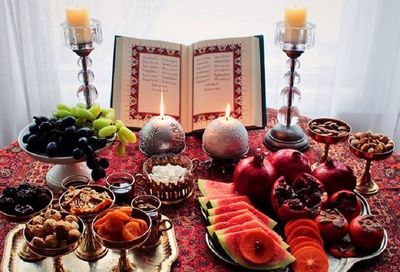An ancient Iranian festival which basically celebrates the coming of the winter solstice and the longest night of the year for centuries is Yalda Night (or Shab-e Yalda; also, Shab-e Chelleh). It refers to a time between the sunset of autumn’s last day (30th of Azar in Iranian calendar equal to 21st of December) and the sunrise of the first day of winter (1st of Dey in Iranian calendar equal to 22nd of December).
It is considered as one of the holy nights and one of the most important festivities in ancient Iran and officially entered the official calendar of the ancient Iranians from 502 BC during the time of Darius I, commonly known as Darius the Great.
Yalda Night, both before and after Islam, has a special place in Iranian culture and has always been considered a motivation for gathering close and distant relatives. The festivities that take place on this night are an ancient tradition.
Since days get longer and nights get shorter in winter, Iranians celebrate the last night of autumn as the renewal of the sun and the victory of light over darkness.
Eating is a delicious part of Yalda Night. Iranians eat nuts, watermelons, and pomegranates on this special night and share the last remaining fruits from summer together. Fruits of Shab-e-Yalda have symbolic significance as well. Some believe that watermelon symbolizes the sun by its spherical shape while others believe that eating watermelon keeps one safe from being hurt by winter diseases. Pomegranate is also a symbol of birth and its bright red seeds symbolize the glow of life.

Reading poems from Divan-e-Hafiz (Fal-e Hafiz) is an entertaining tradition of Yalda Night. Each of the members of a family or a group of friends makes a wish-while keeping it a secret- and randomly opens the book; then the eldest member of the family or friends reads the randomly selected poem loudly. Since the poem is believed to be the interpretation of the wish and the way it would come true, it is fun to interpret the poem and guess the wishes others make. In this way, the last and the longest night of autumn comes to an end happily and the first great day of winter begins.
Shab-e-Yalda and its traditions are so amusing and interesting that it was officially added to Iran’s List of National Treasures in 2008. Yalda Night is also celebrated in countries such as Afghanistan, Uzbekistan, Tajikistan, Turkmenistan, and in some of the Caucasian states such as Azerbaijan and Armenia whilst they share the same traditions as well.
Other country Like Iran, central Asian countries, including Afghanistan, Uzbekistan, Turkmenistan, Tajikistan and some Caucasian states like Azerbaijan and Armenia, and some parts of Pakistan, India and Kashmir which share the same tradition, celebrate Yalda Night.

